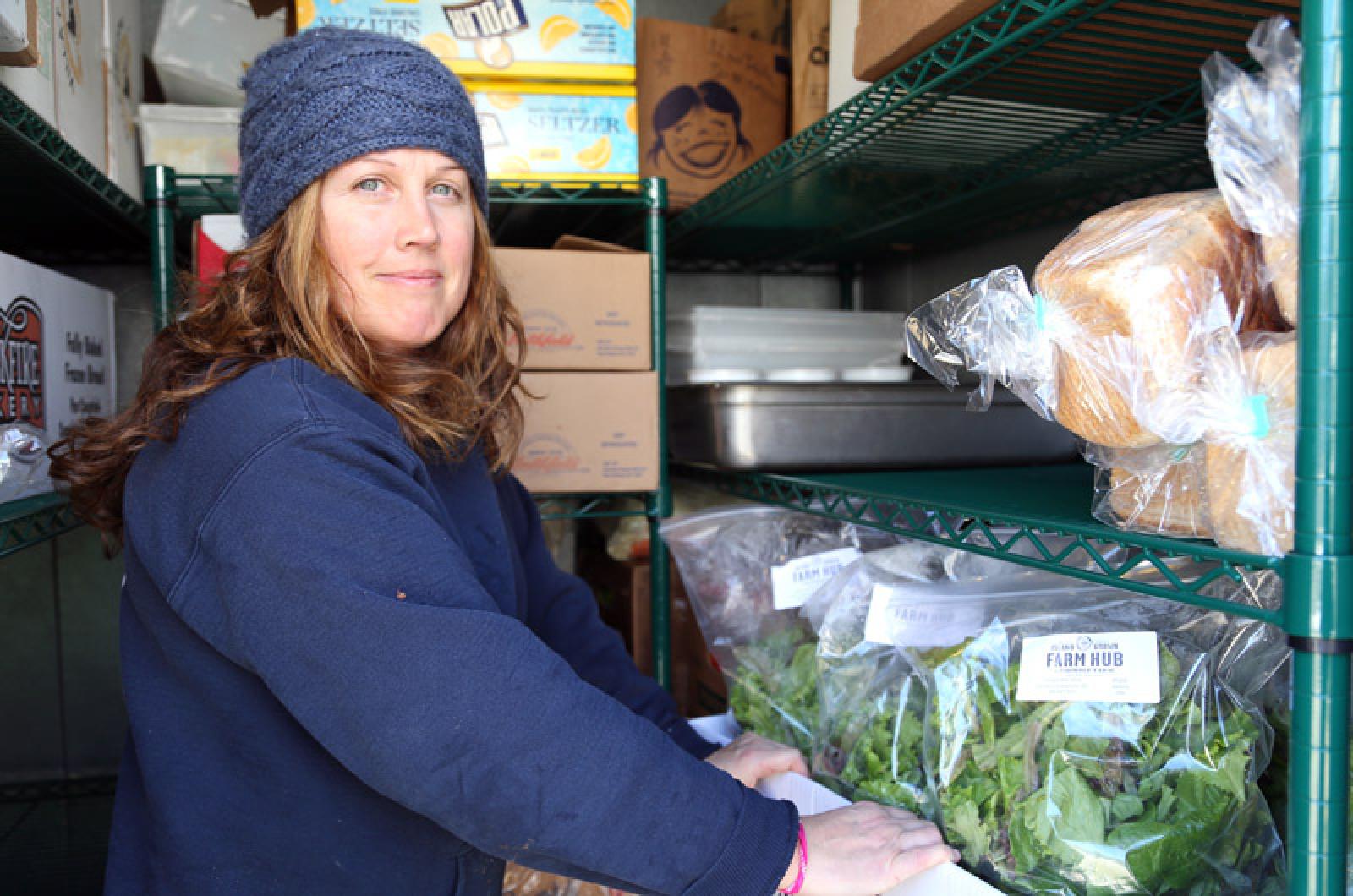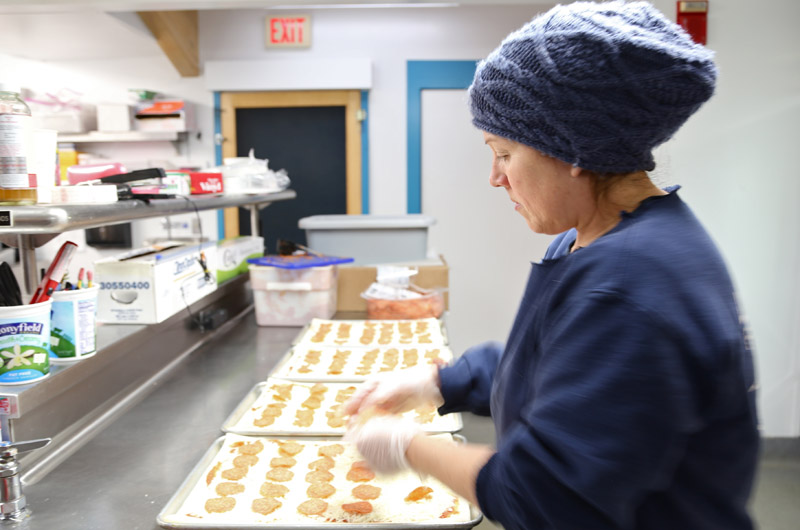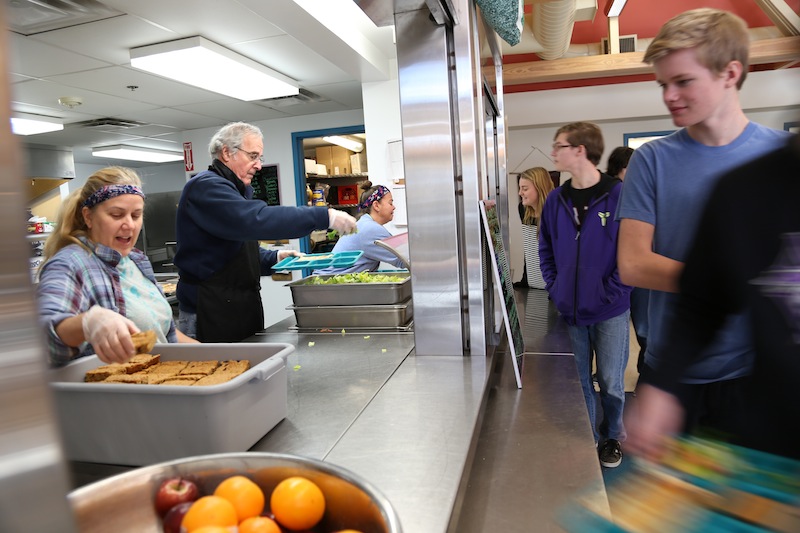It is Wednesday, which means pizza day at The West Tisbury School. At 8 a.m. head cook Jenny DeVivo, her assistant cook Mercedes Ferreira, and relatively new part-time assistant cook Sue Fleming put on their hats and Motley Crue style headbands. These are not your typical hairnet or apron lunch ladies.
Jenny’s red Puma high top sneakers look like they have had a fair share of food dropped on them. She pulls a blue watchman’s cap on her head and tucks in long, wavy hair.
“First and most important, what are we listening to today?” she asks.
Options are discussed — era, ballads and bands. But 1980s pop wins and Madonna’s voice immediately comes on. Jenny sings along as she dances her way to the walk-in refrigerator and freezer — both located outside the school on the path leading to the kitchen door.
“When we renovated this kitchen four years ago, we didn’t know how many people we would be feeding,” Jenny says, explaining why they now have two giant refrigerators located outside. “Today we have almost 100 per cent participation here at West Tisbury and in Chilmark.”
As she loads up her cart, Jenny tells the kitchen story. Five years ago in April, the up-Island regional school district voted to opt out of using a corporate school lunch provider, and hired Jenny. The mission was to cook healthier food and sourcing from as many local resources as possible.
“It was amazing,” Jenny says. “So many people helped us. I can’t possibly name them all. Noli Hoye and Island Grown Schools, Ali Berlow, Nicole Cabot, Jason Napior, Dave Sprague, Steve Gallagher. And Donna [Lowell-Bettencourt, school principal] used her Edgartown connections and salvaged the prep table, the roll-down window, the steam tables, even the sinks from the old Edgartown School. We renovated the kitchen in two months.”
She pauses. “And I must say that I could not do this without Mercedes who left her life in California as a private chef and came here to work with me on 48 hours notice. The person we had hired as my assistant quit right before school started.”
A cold wind whips the refrigerator door open.
“It is a mess moving in and outside with food when it rains, but we make it work,” she says.
Indeed she does. In 2013, Bon Appétit magazine mentioned the West Tisbury School in general and Jenny’s fish chowder in particular as a leader in the farm-to-school food movement.
Jenny adds three lemon seltzers to her pile of food and heads back inside. Mercedes has already chopped a giant pile of lettuce and Sue is making headway on salad bar preparations.
“We wanted to offer the salad bar option every day and Sue makes that possible,” Jenny says. “And because we do pizza every Wednesday, this is one of the days where we are very machine like. Everyone knows what to do.”
She thunks a giant bin of pizza sauce on the counter. “I try to bump up the basic sauce with as many local ingredients and vegetables as I can.” This batch has Island tomatoes, zucchini, carrots and basil in it. “Beetlebung Farm gives us an amazing deal. So does The Good Farm and The Grey Barn. Then there’s Morning Glory Farm, Thimble Farm, Cleveland Farm and Whippoorwill,” she lists. “We are so lucky to have these farmers here. And the restaurants are amazing too. The Right Fork Diner gave us tons of food. The Chilmark Tavern donated about $2,000 worth of food. And Cronig’s helps too. They give us great deals. Everyone is so good to us. As are the gleaners. We get thousands of pounds of free food that way. I could not do this without them.”
Kids and teachers begin stopping by the kitchen, dropping off lunch orders.
“We ask everyone to order in the morning that way we waste less food. I hate wasting food,” Jenny says.
A few minutes later she gets a call from the Chilmark School for their food order. Of the roughly 60 kids at the Chilmark School, 51 want lunch made by Jenny and her team.
Mercedes continues to chop and wash lettuce from Thimble Farm. Sue roasts farm turnips for the salad bar. And Jenny sings and dances as she assembles pizzas with an ease that can only come from making thousands of pies. “We’ve tried all kinds of crusts and sauces and this is the one that seems to please the most,” she says. “It’s a whole-grain crust, or you can opt for a gluten-free crust.”
After making the first 22 pizzas, Jenny pauses to taste Sue’s turnips. “Delicious!” Then she greets a man from Cash & Carry who brings recyclable paper products for the salad boxes that will be delivered to Chilmark. She checks the clock. “Okay, where are we?”
She and Mercedes discuss the shopping list for the next few days and then Jenny begins to calculate orders for the day.
“I suck at math,” she says. That said, she seems to easily organize the orders, adding in stragglers and staff members who have forgotten to stop by, but who Jenny knows from experience will want lunch. Just as she finishes adding up her orders, these very teachers and students begin to sheepishly stop by and ask to be included.
“Don’t worry, I’ve already got you down,” she says.
Jenny heads to the dishwashing area and changes the rinsing water, then it’s back to making more pizzas.
“We clocked how many miles we walk in a day here,” she says, while still dancing and humming to the tune on the radio. “Around seven!” A big number considering the kitchen can’t be more than 700 square feet.
Hungry Eyes by Eric Carmen comes on. Jenny stops in her tracks. “How can they still play this song? It is terrible.”
All agree.
While Jenny may be a natural as pizza maker and chef, cooking was not her first profession. Before most of the children currently at the West Tisbury School were born, she was Jenny DeVivo, singer. Her father, who died when she was three, was a music teacher and a jazz musician. Her mother was an English teacher, but also sang and saw Jenny’s musical potential. When she was young, Jenny sang professionally in New York and by the age of 17 had a record deal with Polygram. She moved to Europe, wrote and recorded and traveled the world as a solo artist.
“I don’t want to glamorize it,” she says. “Sure there were limos and there was the excitement of seeing new places. But being on the road is hard. It was not a life I wanted to have forever.”
In the fall of 1998, she came to the Island to visit family. One day, she stopped by her parents’ seasonal hot dog stand in Oak Bluffs and met Dan Imbrogno, an Island landscaper. “And that was it. I fell in love with him. I went to London, closed up my life there and moved here. It was my chance to create a simpler life.”
Her years in the music industry in Europe did leave her with one skill she could bring to Martha’s Vineyard: cooking. To get a green card to stay in the UK (and for supplemental income), she worked in kitchens in London and Edinburgh, Scotland.
“The Waterfront in Edinburgh taught me so much. I learned from the wonderful people there. Everything from peeling and chopping to how to make flavor profiles and comfort food.”
Janna O’Shaughnessy and Raymond Lincoln arrive in the kitchen to help. Janna is the cashier at the school. She also orders the food for the kitchen. Ray brings and serves lunch to the Chilmark School and then carts everything back to be washed and stored. He puts on a black apron and begins helping Sue.
“It used to be that the Chilmark School would only get sandwiches and salads,” Jenny says. “Ray makes it possible for us to get fresh hot food to the kids.”

The first round of pizzas come out of the top oven, looking picture perfect. Mercedes helps Jenny cut each pizza into eight even slices. As they set out the bubbling pizzas, the clock strikes 11 a.m. and kids begin to file in for lunch. Jenny and Mercedes greet every child by name. “What are you doing today? Roni? Cheese?”
“I feel it is so important for me to know everyone’s name,” Jenny says. “It’s just nice to acknowledge them. To know them. They are good kids. Good people.”
Mercedes moves the kids along. Jenny remarks, “She’s the enforcer.”
As Jenny’s son’s fourth grade class comes through the cafeteria line, his classmate tells her that Rocco has earned a solo part in the winter concert. Jenny smiles. “Okay, but I’m going to pretend you didn’t tell me because I want him to tell me,” she says. “He’s going to have an outer body.”
Later she leaves the kitchen and visits her son and his friends at a table. Rocco tells her the news. She is exuberant. Then it’s back to the kitchen.
“I was 38 when I became a mom. I take it seriously. I mean I don’t want to squash him, but I want him to experience stuff and I try to help guide him.”
At 12:50 p.m., lunch is over and Jenny and her team begin to clean up. Ray comes back from Chilmark, carrying a load of dirty trays. Everyone knows what to do and moves around the kitchen and each other with ease. Janna reports that they’ve cooked for 369 people today.
“An average day,” Jenny says.
She heads to her office, a small room with a window that overlooks the parking lot. She lies down on the floor and rests her legs up the wall for a moment.
“You know, I’m five-foot-four and have been since I was 18?” She sighs. “I don’t think of my life in terms of it being on a certain trajectory. My life feels like it is exactly as it is supposed to be. Cooking food for these kids is so rewarding. This is good for now. Better than good. I love my job.”
While she may be satisfied, Jenny also has big plans. She wants to continue to expand every child’s palate. She is starting a breakfast program. “I want to serve whole-grain waffles, my carrot zucchini muffins, some sort of breakfast sandwich with local eggs.”
She wants to write a cookbook for the school lunch program. She wants to serve locally-sourced organic whole milk, or at least organic whole milk in the cafeteria. She wants to learn how to make charcuterie so they can make local pepperoni for the kids. She wants to help other schools do what she and Mercedes do. She wants to keep learning and will drive to New York to meet with the lunch ladies from a school in Queens that has received national attention for its food program.
But for today, she will finish cleaning up, do a little prep for tomorrow’s lunch, take her son to his saxophone lessons, then head home to make fish tacos and listen to music.
What's Cooking with Jenny DeVivo
Occupation: Head chef for the up-Island regional school district (West Tisbury School and Chilmark School).
Age: 48.
Born: Nyack, N.Y.
Moved to the Island: 1998.
Lives in: West Tisbury.
Husband: Dan Imbrogno, “We met at my parents’ hot dog stand in O.B.”
Son: Rocco Imbrogno, age 10.
Pets: Two dogs, Otis and Hooch, both rescues.
Chickens: 10. “Most years, we also raise about 50 meat birds in the spring and slaughter them.”
Favorite food: Roasted vegetables. Especially roasted fennel.
Best meal lately: State Road Restaurant.
Food journey she wants to take: “I would like to take Rocco to Japan.”
Biggest kitchen catastrophe: “I tried to make vegetable lo mein for the schools. It was a disaster. I cried like a baby. The vegetables were fine. It was the noodles. They did something that I cannot even describe. We made a lot of rice. Very quickly.”










Comments (5)
Comments
Comment policy »